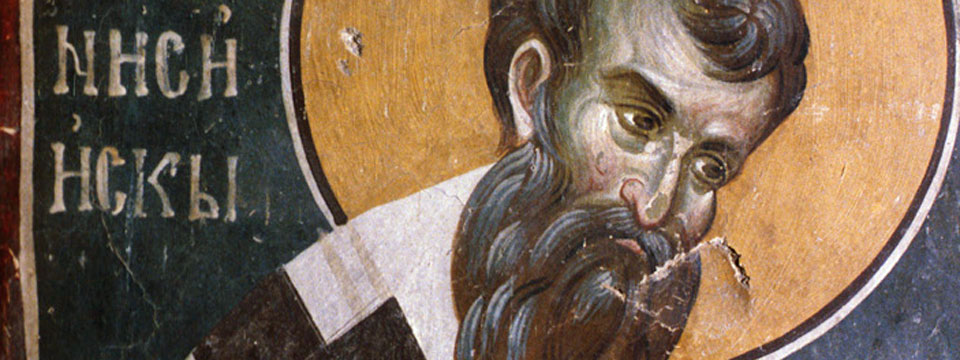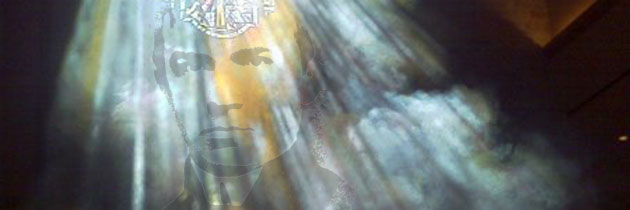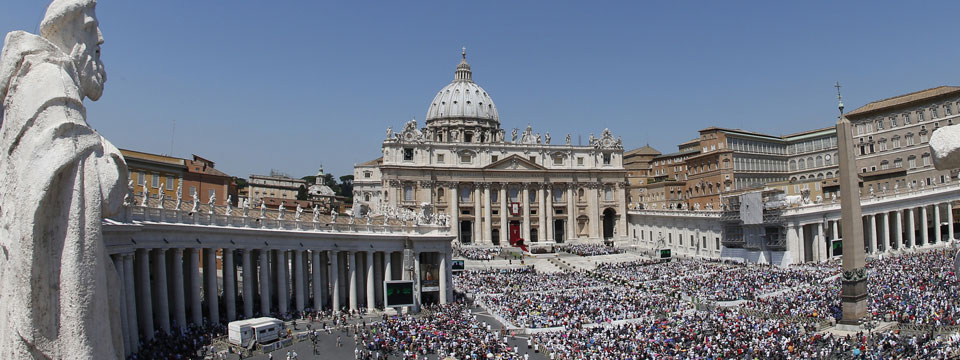Let me put a question that I have put to others with interesting results: What would you say is the central Christian affirmation, the most definitive confession of the Christian Faith?
The central Christian revelation, I suggest, is that the divine absolute is both one, and somehow mysteriously and inalienably three. In other words, the ultimate divine reality is personal and is a communion of love, with all the consequences that follow for one’s understanding of the creation of the universe, the constitution of man and the economy of salvation.
The all-important truth is Deus Caritas Est in the declaration from the First Letter of John with which Pope Benedict opens his encyclical and which gives it its name: God is love, and he who abides in love, abides in God, and God abides in him. (1 Jn 4:16)
This theology – I mean this account of God – sets Christianity radically apart from Islam. God, the divine absolute, is not a cosmic monad, because if he were, then how could St John’s saying, God is love, be true? Love certainly means a relation of person to person, and if at this ultimate echelon of reality, sublimely transcending all created things, there is only an absolute monad, and not the three divine persons, where is the love? How can love be? How then could love be the ground of all creation? Instead you have a kind of cosmic divine ego, which might exercise a kind of condescension to creatures – you certainly have power and command – but you do not have love inherently on the level of the divine, since no possibility of relation exists on that plane. All that is possible in this sort of theology is a strict doctrine of divine voluntarism and fatalism, with huge consequences for anthropology and religious/social relations. In my opinion, the entire character of historical Islam follows ineluctably from its terribly mistaken, post-Christian theology.
Hence let us treasure this core affirmation of our faith with which we began this talk: In the name of the Father and of the Son and of the Holy Spirit. They are the sacred words of our Lord himself given in Matthew 28:19, the words that are invoked in the administering of holy Baptism, and every time we make the sign of the Cross.
Islam has an imitation of this formula, the very words with which the Qu’ran begins, but words compatible with rejection of the Holy Trinity: In the name of God the compassionate the merciful. I invite you then to appreciate ever more deeply this core formula of our Christian faith: In the name of the Father, and of the Son, and of the Holy Spirit, because in praying this we avow that God is tri-personal and that hence it is possible for the divine absolute inherently to be, as indeed it is, love.
I think that a part of Pope Benedict’s intention in his encyclical, Deus Caritas Est, is in fact a quiet rebuttal of the ground of Islamic religio-political jihad, which is its anti- trinitarian theology. He says, ‘In a world where the name of God is sometimes associated with vengeance or even a duty of hatred and violence, this message is both timely and significant.’
Pope Benedict’s encyclical Deus Caritas Est on Eros
Deus Caritas Est is a lovely teaching, calm and ordered and readily accessible with a little close attention. Pope Benedict clearly also has a number of other agendas in his encyclical. He reports with candour a series of criticisms and misunderstandings of the Christian position and deals with them by quiet reaffirmations of the genuine Christian and Catholic faith and practice. In the second part he is clearly concerned with some issues internal to the Church, and especially the corruption of her exercise of practical charity by ideological motives, and by the lack of prayer and connection to God, leading to mere social activism.
In the earlier, more ‘theoretical’ part, he is concerned about misunderstandings of the role of eros in Christian theology and anthropology. Years ago in a second-hand book shop in Carlton, I came across and purchased a book, Agape and Eros, by a Swedish Lutheran theologian who became Lutheran Bishop of Lund, Anders Nygren (1890-1978). The book had actually belonged to the former Anglican bishop of Melbourne, David Penman. Nygren’s book created quite a stir in its time. Nygren set up an all too neat and simple dichotomy: Agape is the name for that which is alone Christian love, and it is the opposite of Eros, which is the name for a worldly and pagan concept of love. Agape is descending, self-sacrificial love, only concerned for the good of the other, whereas eros is ascending, self-interested love, possessive of the object of its desire. Plato gets short shrift in Nygren, and so alas, does St Gregory of Nyssa. He builds his hypothesis on a linguistic theory that there are neat distinctions in the various Greek words for love. Let me tell you from long experience in reading Greek, the semantics of the various verbs for love in Greek, agapao, erao, phileo and storgeo, are far from so discrete as Nygren thinks. Without a doubt, Protestant ideas of soteriology affected his thinking, ideas about being saved by faith alone without works, imputed righteousness, and the rejection of the analogia entis (see CCC #50), which together with the analogia fidei is held to be valid and necessary in Catholic life, faith and theology.
Pope Benedict gently corrects the misunderstandings of this thesis. He points to the use of spousal and erotic love used in Scripture as a privileged metaphor for the relationship of God and man.
He even mentions a beautiful myth recorded by Plato, according to which man and woman were originally two halves of a unitary nature, but which was sundered because of pride, and hence each has a deep-seated need to rejoin the other half. This actually comes from Plato’s work, the Symposium, which is of capital importance in the history of the understanding of eros. If you have any pretensions to Catholic intellectual life, you should make sure that you make a reading of it part of your feeding of the mind. Here is the pre-eminent source in classical literature for the concept of a transcendent eros. Diotima of Mantineia, Socrates’ preceptress, probes the real nature of eros.{{1}} She argues that it is a mistake to simply to identify eros with sexual passion. Its essence rather is in yearning for the good and the beautiful. Once this yearning is emancipated from confusion, once one learns to govern it with virtue, it is capable of leading the healthfully erotic soul upward to the ultimately Good and the ultimately Beautiful, what she calls ‘the divine beauty,’{{2}} which is easily assimilated to the Christian concept of God.
Then Pope Benedict elucidates the scriptural use of eros, identified with spousal love, as a metaphor for the relationship of God and man. I never tire pointing out in my lectures that this powerful metaphor can be followed like a thread linking the entire Scripture, beginning with the creation of man and woman in the image of God, in Genesis, to the cry of spousal longing on the part of the Bride who is the Church, in the very last verses of the Apocalypse. Benedict insists that the Old Testament ‘in no way rejected eros as such’, but ‘declared war on a warped and destructive form of it’ (p. 10). Debased eros then, ‘needs to be disciplined and purified, if it is to provide not just fleeting pleasure, but a certain foretaste of the pinnacle of our existence, of that beatitude from which our whole being yearns.’ In short, he says, ‘Purification and growth in maturity are called for; and these also pass through the path of renunciation. Far from rejecting or “poisoning” eros, they heal and restore its true grandeur.’
Seeking to understand this path of ascent and purification, Pope Benedict turns to the Song of Songs, ‘an Old Testament book’ he says, ‘well known to the mystics’. This book, a series of passionate appeals between bride and groom, glowing with sensuousness and ardour, was nevertheless given a place in the canon. No doubt its inspired redactor and/or those who canonised it, read it as a metaphor of the relationship between God and Israel, a symbolic tradition initiated by the eighth century prophet Hosea. Perhaps the Song is best understood religiously as the presentation of a hoped- for consummation in the future when Israel will no longer be unfaithful to the Lord. Her faithfulness will be proved even when the Lord seems to have vanished and she cannot find him. Her dispositions will have become so purified and steadfast, that she will no more turn aside to another. The experience of absence does not ruin her aspiration, but leads to a redoubling of her fidelity. As Pope Benedict characterises it: ‘Love now becomes concern and care for the other. No longer is it a sinking in the intoxication of happiness; instead it seeks the good of the beloved: it becomes renunciation and it is ready, and even willing, for sacrifice’ (p. 13). Without doubt these mysterious passages about the Bridegroom’s absence that have so inspired the apophatic theologians, virgins and mystics over the centuries, are the key to the religious meaning of the Song of Songs, through which we pass from earthly marriage to metaphor to the mystical heights.
In presenting eros and agape as two dimensions of the single reality of love: ‘at different times, one or other dimension may emerge more clearly’ (p. 17), Pope Benedict shows himself in complete accord with those Church Fathers who knew how to use the best of Plato’s hints about a spiritual eros in service of the Christian life and faith rooted in the revealed word of God. Such are Origen, Augustine, Gregory the Great, Pseudo-Dionysius and Gregory of Nyssa (some, but not all of them acknowledged in the footnotes of the Pope’s encyclical). You know that wonderful Latin hymn for Holy Thursday, popularised by the Taize chant: Ubi Caritas et Amor, Deus ibi est. If we use the exact Greek equivalents it means: Where there is agape and eros, God is there. There is some scholarly dispute these days as to whether the original words were Ubi Caritas est vera. At any rate, Pope Benedict alludes to another, much earlier source for this saying (p. 18, p. 70 n. 7), namely, Pseudo-Dionysius, a late fifth century Syrian writer, whose books, especially On the Divine Names and Mystical Theology, had huge influence in the development of Christian sacramental and mystical theology.{{3}}
Connections with St Gregory of Nyssa
One of Pseudo-Dionysius’ major literary sources was St Gregory of Nyssa. And that brings us to consider further the intellectual and theological antecedents of Joseph Ratzinger. You will notice in the endnotes of Deus Caritas Est, a couple of references to ‘SCh’ (that is, Sources Chretiennes). This is a magnificent project to publish a complete library of the Fathers of the Church, edited by up-to-date scholars, accompanied by a French translation, cheaply and easily produced. The project was launched in the late 1950s by two Jesuit theologians and patristic scholars, Henri de Lubac, and Jean Danielou. Way back in those days, these two were two leading lights of a theological movement called Ressourcement, and the then Joseph Ratzinger was very much drawn to the writings of this group. De Lubac wrote a very influential work, Catholicism, which promoted an ecclesiology and a way of doing theology rooted in the fathers and in the liturgy. And Jean Danielou was a scholar of Gregory of Nyssa, having devoted his doctoral dissertation to Gregory. He was as responsible as anyone for bringing Gregory to the forefront of theological interest in the Church and the Academy today, although his name should be bracketed with that of Werner Jaeger of Harvard.
Gregory was fully heir to all those considerations sketched by Pope Benedict in his encyclical. Eros is by no means to be relegated as something alien to authentic Christian faith and life, but is an intrinsic element in the mystery of love at the heart of our faith. Gregory fully concurs with Plato that eros is a kind of desiring and motivating faculty with which God has endowed the human being, a faculty which of itself is morally neutral. If it is corrupted it becomes passion or vice, a moral and spiritual pathology. But if it is governed by reason and incorporated in the seeking of virtue, it leads to honourable and godly marriage, and beyond that plays a vital and indispensable role in our drawing nearer to God, in whose image, Gregory would stress, we were created.
Gregory on the erotic disposition
But first, let us explore a little the nexus between Gregory’s anthropology and his doctrine on spiritual progress. In researching my book on Gregory’s letters, I was prompted at the very end to insert a letter into it that had never appeared before in English. Indeed it was difficult to get any certain information on it in any language, or even a decent Greek text. In the end a most gracious scholarly gentleman, Professor Muhlenberg of Gottingen, came to the rescue, and sent me the text he was preparing. When in my desperation for a text I finally sent an e-mail to him about it, he replied: ‘Amazing! All enquiries about this letter end at my desk.’ He was in the process of editing it for publication. I have been privileged to be asked to review it for a German theological journal.
This particular letter only survives because it was chosen, minus the introduction, to be added to the corpus of Greek canon law as a patristic testimony. Its setting is this. At some time in the later 380s, Otreius of Melitene died, and Gregory appears to have been one of those bishops who co-ordained his successor, Letoius. The new bishop approached his first Lent and Easter, the time for the Church’s administration of penance in those days, as well as Baptism. Those who had observed their appointed years of penance for various mortal sins were finally admitted to Holy Communion in the Easter Liturgy. Letoius felt he needed guidance and help from a senior and experienced bishop as to what his duties as a bishop were in administering penance. He wrote to Gregory, whose reply to Letoius is our letter.
The wonderful thing about his letter is that Gregory sets out what he has to say about penance entirely in the context of the spiritual anthropology which should undergird the bishop’s approach. The ruling idea is not that of enacting the legal decisions of a tribunal but that of a spiritual physician diagnosing and treating spiritual illnesses and verifying progress by appropriate signs of moral and spiritual convalescence. This is seen most of all in terms of the penitent’s own prohairesis, his choice, will or disposition. The process of penance is intended to be a spiritual and moral re-education. It is set squarely in terms of the human vocation to resist the slide into vice and to contend for virtue, and in Christian terms the vocation to transformation in Christ.
Gregory identifies three broad aspects of the soul: the reasoning, desiring and ‘spirited’ faculties or ‘the rational, the concupiscible and the irascible’. This is the way he characterises the concupiscible:
That movement of the desiring part is virtuous which leads the yearning upwards to the really desirable and the truly beautiful,{{4}} so that if there is in us any erotic power and disposition{{5}} it is wholly engaged in that direction, persuaded that nothing else is worth seeking in one’s own nature except virtue and a nature that overflows with virtue.
This phrase ‘the erotic power and disposition’ is very distinctively Gregory’s and keys us in to the deepest characteristics of his mystical theology.
The French Benedictine scholar, Pouchet, has demonstrated that the phrase is very distinctively Gregory’s: c’est une expression typiquement nyseene.’{{6}} He used it to identify and reassign a letter in which it appears, to Gregory’s authorship. Previously it had been included among Basil’s letters as Letter 124. I include it in my book as Letter 36.{{7}} In fact Gregory speaks of ‘the erotic power’ in his very earliest work On Virginity, written at the behest of his brother Basil in 371. It should give one pause, Gregory wholly predicates virginity or celibacy for the Lord on the engagement of the erotic power, not its sacrifice. [Does this have something to say to the culture of priestly celibacy in the western Church? Does it have anything to say to the crisis of clerical sexual abuse?] In his works of mystical theology towards the end of his life, the Life of Moses and his Sermons on the Song of Songs Gregory speaks again of ‘erotic disposition.’
Later in his canonical letter on penance Gregory specifically addresses the disorders of this desiring faculty of the soul. There is a very interesting passage I should like to share with you:
a. Of those who fall into sin through desire and pleasure, this is the division: the one is called adultery and the other fornication. But it pleases some who think more accurately{{8}} to consider the offence of fornication also as adultery, since there is only one legitimate union, that of a wife with a husband, and a husband with a wife.{{9}} b. Accordingly all that is not legitimate certainly transgresses the law, and anyone who lays claim to what is not proper to himself,{{10}} clearly lays claim to something alien. For one helpmate is given to man by God (cf. Gen 2.20-22) and one headis assigned to a woman (cf. 1 Cor 11.3). Therefore if someone possesses his own vessel, as the divine Apostle calls it, that is proper to himself (I Thess 4.4),{{11}} the law of nature concedes ajust use.{{12}} c. But if someone turns aside from what is proper to himself, he shall become something wholly alien. For all that is not proper to each person is alien to him, even if he does not acknowledge what it is that is mastering him.
In view of the morally catastrophic advance of the homosexual lobby in our society, and even among some in the Church, it is great to hear from this Church Father an explicit statement that marriage is the only legitimate form of sexual union of Christians, and that it consists of the union of one man and one woman. In Gregory’s argument, the indulgence in homosexual activity is a very grave matter. He thinks it effectively equivalent to the offence of adultery, though the penance traditionally ascribed to it is only that of fornication. He goes on to say:
e. Yet both bestiality and pederasty are also reckoned in this latter division,{{13}} because these are also an adultery against nature. For the injury is in regard to what is alien and contrary to nature. Since this is the division assigned to this type of sin too, the general cure applies, that a person is purified from the passionate craving for pleasures of these kinds through penitence.
There is no doubt that by ‘pederasty’ Gregory includes what we today call ‘homosexual activity.’ But so aggressive is this lobby that for years now they have attempted to make a neat distinction, and say that the ancient term pederasty only refers to what today is called pedophilia, and homosexual acts between consenting adults are not meant. But can you imagine it: that Gregory here is stygmatising the sin of pedophilia, but that homosexual acts, after all, are okay? It is ridiculous. Scholars who have allowed the meaning of Greek words to be hijacked by homosexual lobbyists need to search more comprehensively and honestly for the way that the term pederasty is used.
Gregory continues his discussion on the upright and the debased use of our erotic disposition, in his On the Soul and the Resurrection. This work has been called the Christian Phaedo – another one of those classical works of the Fathers you would do well to make part of your reading. The Phaedo shows Socrates on the eve of his death discussing the immortality of the soul. On the Soul shows Macrina on the eve of her death discussing with Gregory reasons for belief in immortality and the resurrection. In a long section studying human emotions and passion {On the Soul 3.54-58), Gregory returns to his discussion of the erotic disposition:
Now we think that by the good seed the Word means the corresponding impulses of the soul, each of which, if it is only cultivated for the good, necessarily puts forth in us the fruit of virtue. 55. But since there has been sown among these a thoroughly mistaken judgment as to beauty, and that which alone is truly beautiful in its own nature (cf. Mt 19.17){{14}} has been thrown into shade by the sprout of delusion springing up along with it, 56. for the principle of desire has not sprung up and matured towards that which is beautiful by nature for which reason it was sown in us, but it has altered its growth towards the bestial and irrational, the desiring impulse being steered in this direction by the mistaken judgment as to beauty, 57. and in the same way the seed of anger has not been forged into courage but has only armed us to fight against our own kind, and the power of affection{{15}} has deserted the intellectual and gone completely mad for the enjoyment of the sensual beyond all measure, and in like manner the other emotions have put forth the worse rather than the better shoots, – 58. because of all this the wise farmer allows the sprouts that have sprung up among his seed to remain there, to ensure that we are not altogether stripped of better hopes if desire were also uprooted along with the useless sprouts.
Now let us take this healthfully governed erotic?and let it take us onward and upward to better things. In On the Soul 6:32, Gregory turns to the subject of love. Here he uses the term agape, following Paul, showing how it synthesises and subsumes all the virtues. You will easily perceive that here eros itself has been taken up into and entirely merged with his exposition of love:
32. Love therefore, is the foremost of all the accomplishments of virtue and of the commandments of the law. So if the soul ever attains this end it will have no need of the others, because it has embraced the sum of all that is and because it seems that love alone somehow preserves within itself the character of the divine blessedness. For the life of the sublime nature is love, since the beautiful is wholly lovable to those who recognise it, and the divine recognises itself. But then knowledge becomes love, because that which is recognised is beautiful by nature. 33. The insolence of satiety cannot touch that which is truly beautiful. With no satiety able to disrupt this state of love for the beautiful, the divine life will always be activated through love. This life is beautiful by nature and lovingly disposed by nature toward the beautiful, and knows no limit to the activity of love, 34. because no boundary of the beautiful can be comprehended such that love might leave off at the boundary of the beautiful. Indeed the beautiful is only limited by its opposite, but since its nature is unreceptive to the worse, it will go on towards the boundless and limitless good.
The implications of Theology for human spiritual progress
‘It will go on towards the boundless and limitless good’. In his mystical works Gregory endeavours to show the vicissitudes and necessities the believer must undergo as he/she approaches more nearly to God. Here Trinitarian theology has a direct bearing on what happens to us as we make progress toward divine union. Basil and the two Gregorys had been at pains to demonstrate against Arian theologians who had an overweening confidence in rational argument and thought that they could define what God’s essence is and so grasp it. No, said our Fathers, the nature or essence of God cannot be grasped by any human being. God can only be humbly and wonderfully known in his energeia, or activities, operations. This is the Cappadocian doctrine of the incomprehensibility (‘ungraspableness’) of the Divine nature. Gregory shows what this theological truth means to the soul seeking to progress on the way to God:
The mind goes on ahead and, through ever greater and more perfect attention, achieves an understanding of the truly intelligible, thereby drawing closer to the vision by which it may better discern the indiscernibility of the divine nature … In this matter true vision belongs to the one who is being sought; and in this matter, not seeing is itself the seeing.{{16}}
Gregory of Nyssa himself took this further with his doctrine of the Divine Infinity, which is one of his most original and important contributions to Christian theology. In Platonic and Neo-platonic philosophy and in Origen’s theology, perfection was seen in terms of completeness, simplicity and a defined whole. Plotinus in the Enneads 6.6.2 links together the bad, multiplicity and infinity: ‘Multiplicity therefore is a revolt from unity, and infinity a more complete revolt by being infinite multiplicity. Hence infinity is bad, and we are bad when we are a multiplicity’. In this view one can reach satiety even of participation in the divine which leaves the way open to a return to lower orders (cf. Origen, On First Principles 1.3.8, 2.9.2). No, says Gregory, the divine nature is perfect in its very boundlessness and infinity. It is ‘beyond every circumscription’ {Catechetical Oration 8.65). Thus Gregory rejects Origen’s teaching of koros, or satiety, teaching that the partaker of the divine nature can never be sated with God who has no limits. In this life, spiritual attainment for the human being therefore consists in never finally attaining but always reaching out for the God who is always greater.
The doctrines of the Divine incomprehensibility and infinitude of the divine nature lead to a pivotal concept of Gregory’s mystical theology: epektasis, or stretching forward, or pressing on. He derives the idea especially from Phil 3:13 Brothers, I do not reckon I have attained, but there is only one thing, forgetting what lies behind I stretch forward for what lies ahead. Let us listen to Pope Benedict’s comment on Gregory’s use of Paul’s concept, in his recent catechesis:
Gregory uses an effective image already present in Paul’s Letter to the Philippians: epekteinomenos (3:13), that is, “I press on” towards what is greater, towards truth and love. This vivid expression portrays a profound reality: the perfection we desire to attain is not acquired once and for all; perfection means journeying on, it is continuous readiness to move ahead because we never attain a perfect likeness to God; we are always on our way (cf, Homilia in Canticum 12.1025D).
Gregory on the Song of Songs
Gregory explores the implications of this theology for our human spiritual progress especially in his two late works, The Life of Moses, and Homilies on the Song of Songs. Moses’ journey through the cloud of theophany into the darkness where God is, morphs into the bride of the Song of Songs who seeks her bridegroom but cannot find him. Thus Gregory explains:
Moses’ vision of God began with light (cf, Ex. 19:18); afterwards God spoke to him in a cloud (Ex. 20:21). But when Moses rose higher and became more perfect, he saw God in the darkness (Ex. 24:15-18).
Now the doctrine we are taught here is as follows. Our initial withdrawal from wrong and erroneous ideas of God is a transition from darkness to light. Next comes a close awareness of hidden things, and by this the soul is guided through sense phenomena to the world of the invisible. And this awareness is a kind of cloud which overshadows all appearances, and slowly guides and accustoms the soul to look towards what is hidden. Next the soul makes progress through all these stages and goes on higher, and as she leaves below all that human nature can attain, she enters within the secret chamber of the divine knowledge, and here she is cut off on all sides by the divine darkness. Now she leaves outside all that can be grasped by sense or by reason, and the only thing left for her contemplation is the invisible and the incomprehensible And here God is, as the Scriptures tell us in connection with Moses: But Moses went into the dark cloud wherein God was (Ex 20:21).{{17}}
Gregory uses these truths of the divine incomprehensibility and infinitude, and the concept of spiritual epektasis, as a doctrinal key with which to wonderfully interpret the distress of the bride in the Song of Songs (Cant 3:1-2) when she cannot find her beloved in her bed at night and goes searching about the city streets:
Upon my bed at night I sought him whom my soul loves.
I sought him, but found him not.
I called to him, but he gave no answer.
I will arise now and go about the city,
in the streets and the squares I will seek him whom my soul loves.
I sought him, but found him not (Cant 3:1-2).
In Gregory’s interpretation the Bride’s inadequacy, her very inability to find her Beloved, the seeming failure of spiritual eros, the experience of ‘the sting of intolerable yearning’ for the Divine Beauty that can never be definitively grasped, is, in paradoxical reality, the very consummation of all her strivings, even in eternity. Eros is in a sense crucified, and yet is mysteriously ever renewed in a never ending progress in the Divine Beauty.
I am happy to leave you turned towards heaven and eternity with the following passage in which Gregory interprets the Song of Songs. You will find that it brings us to the first words of Pope Benedict’s first encyclical God is love:
The soul, having gone out at the word of her Beloved, looks for Him but does not find Him…. In this way, she is in a sense, wounded and beaten because of the frustration of what she had been longing for, now that she thinks that her yearning for the Other cannot be fulfilled or satisfied. But the veil of her grief is removed when she learns that the true satisfaction of her desire consists in continuing to go on with her quest and never ceasing in her ascent, seeing that every fulfilment of her desire continually generates a further desire for the Transcendent. Thus the veil of her despair is torn away and the bride realises that she will always discover more and more of the incomprehensible and unhoped for beauty of her Spouse, throughout all eternity. Thereupon she is torn by an even more urgent longing, and she … communicates to her Beloved the affections of her heart. For she has received within her God’s special dart, she has been wounded to the heart by the barb of faith, she has been mortally wounded by the arrow of love. For God is love (1 Jn 4:8).{{18}}
It is precisely in this sort of scriptural exposition that Gregory of Nyssa becomes the Father of Christian Mysticism. He offers the first theological and scriptural foundations of apophatic theology. Apophatic means literally ‘that which cannot be expressed’, and it is often used of this ‘divine darkness’, the experience of God’s seeming absence or opacity by deeply faithful souls. Gregory is the first Christian theologian to show how this paradoxical and painful experience is a very real echo of a truth about God’s transcendent nature, and that it can in fact mean that the soul that is experiencing it is making the most genuine kind of progress towards the divine, not away from it. Such darkness is not the destructive negative experience of God that comes of nihilism and unrepented sin, but something strangely and powerfully upbuilding that comes with the plenitude of faith, hope and love. You only have to think of the mysterious and painful night of faith experience by St Therese of Lisieux, as innocent and pure a dove as you could hope to find. And think of what has only been revealed recently of the fearful night of faith endured for many years by Blessed Teresa of Calcutta. If anyone was steeped in the divine virtues that woman was. Down the centuries we are going to receive other insights into this theological and mystical reality from other great saints and doctors of the Church, and notably from St John of the Cross, who explains it in terms of the advance of the theological virtues through the direct work of God in our souls, which has the effect of drying up our more human ways of doing things that we used to rely on. But it is St Gregory of Nyssa in the late fourth century who is the first to attempt to explain it, and who thereby justly deserves the title, ‘father of mysticism’ in the Church.
[[1]]Plato, Symposium 201D-212C. See Plato with an English translation?V Lysis Symposium Gorgias, ed. and tr. by W.R.M. Lamb (London: Heinemann, 1925), 172-209.[[1]]
[[2]] Symposium 21 IE, ibid. p. 206.[[2]]
[[3]] His works were translated into Latin very early, in the 6th century, and they cannot have been easy Greek. Who would have been the translator? Dionysius Exiguus is surely a candidate. Pseudo-Dionyius was certainly known to St Thomas Aquinas, and of course, to St John of the Cross, who picked it up from the famous oxymoron the bright darkness, to characterize the presence of God in the dark night experienced by the advanced mystic.[[3]]
[[4]] The movement of virtue is always anagogical, leading upward.[[4]]
[[5]] ?[[5]]
[[6]]J.R. Pouchet OSB, ‘Une Lettre Spirituelle de Gregoire de Nysse identifiee: L’Epistula 124 du corpus Basilien’, Vigilianae Christianae 42(1988), 28-46 at 32.?[[6]]
[[7]] See my Gregory of Nyssa: the Letters (Leiden: Brill, 2007), 261, and n. 162 for a listing of Pouchet’s evidence, and my own.[[7]]
[[8]] Gregory seems to tacitly mean himself. He goes on to interpret the concept of adultery, as any union which is alien to the integrity of one’s bodily nature.[[8]]
[[9]] Since the Greek terms do double duty, the latter part may also be translated: ‘that of a woman with a man, and a man with a woman’. This principle of heterosexual monogamy as the only form legitimate sexual union, rules out not only polygamy and heterosexual unions outside marriage but also and especially acts of homosexuality and bestiality as Gregory goes on to explain (31.4e).[[9]]
[[10]] What pertains to oneself, one’s own.[[10]]
[[11]] ‘Vessel’ refers to sexual organ; ie, he maintains his sexual faculties in integrity and self-control. In other words, he is committed to the virtue of chastity.[[11]]
[[12]] That is, in heterosexual monogamy.[[12]]
[[13]] That is, the division of adultery just mentioned.[[13]]
[[14]] The ultimate and only intrinsic good is the divine. In this teleology our intellectual conceptions of the good, governs what we seek and will. According to Plato Meno 77C-E, Socrates argues that if one knows what is truly good, one will of necessity act virtuously.[[14]]
[[15]] ?[[15]]
[[16]] From the Life of Moses, quoted in The Faith of the Early Fathers, vol. II, selected and translated by W. A. Jurgens (Collegeville MN: the Liturgical Press, 1979), p 45.[[16]]
[[17]] From Glory to Glory, Texts from Gregory of Nyssa’s Mystical Writings, introd. Jean Danielou, transl. H. Musurillo (Crestwood: St Vladimir’s Seminary Press, reprint 1979), p. 247.[[17]]
[[18]] Cited in Danielou, op. cit, p. 45.[[18]]






